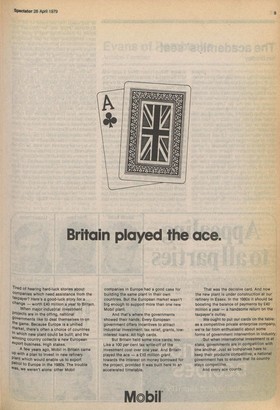Britain played the ace.
Tired of hearing hard-luck stories about Companies which need assistance from the taxpayer? Here's a good-luck story for a Change — worth £40 million a year to Britain.
When major industrial investment Projects are in the offing, national governments like to deal themselves in on the game. Because Europe is a unified market, there's often a choice of countries in which new plant could be built; and the Winning country collects a new European export business. High stakes.
A few years ago, Mobil in Britain came UP with a plan to invest in new refinery Plant which would enable us to export Petrol to Europe in the 1980s. The trouble was, we weren't alone: other Mobil companies in Europe had a good case for building the same plant in their own countries. But the European market wasn't big enough to support more than one new Mobil plant.
And that's where the governments showed their hands. Every European government offers incentives to attract industrial investment: tax relief, grants, lowinterest loans. All high cards.
But Britain held some nice cards, too. Like a 100 per cent tax write-off of the investment cost over one year. And Britain played the ace — a £10 million grant towards the interest on money borrowed for the project, provided it was built here to an accelerated timetable. That was the decisive card. And now the new plant is under construction at our refinery in Essex. In the 1980s it should be boosting the balance of payments by £40 million a year — a handsome return on the taxpayer's outlay.
We ought to put our cards on the table: as a competitive private enterprise company, we're far from enthusiastic about some forms of government intervention in industry.
But when international investment is at stake, governments are in competition with one another. Just as companies have to keep their products competitive, a national government has to ensure that its country stays competitive.
And every ace counts.






































 Previous page
Previous page